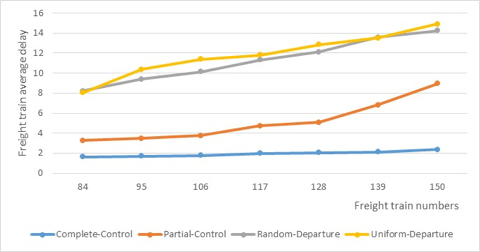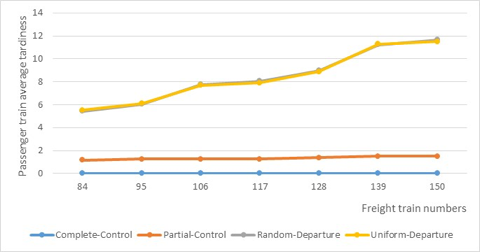News | METRANS Researcher Investigates the Integration of Passenger and Freight Rail Scheduling Problem
Stop the VideoNews

METRANS UTC
METRANS Researcher Investigates the Integration of Passenger and Freight Rail Scheduling Problem
Friday, September 16, 2016
by By Shichun Hu, MSISE 2017
METRANS Transportation Center Associate Director, Professor Maged Dessouky recently completed a project named Integration of Passenger and Freight Rail Scheduling with the help of Ph.D. candidates Liang Liu, Santiago Carvajal and Lunce Fu.
Nowadays, in the United States, the freight railway industry is already running without much excess capacity which has become a large issue due to rapidly increasing demand for freight railway transportation. Train scheduling in urban rail networks is greatly complicated. This is primarily because both passenger and freight trains share the same tracks despite both them having different characteristics and priorities. This issue on how to better plan and schedule freight and passenger trains has brought much attention from researchers as well as practitioners so that current railroad trackage can meet the expanding demand in the future.

Source: Getty images
Professor Dessouky, along with 3 Ph.D. candidates, established a Mixed Integer Programming (MIP) problem with routing constraints, travel time constraints, deadlock avoidance and safety headway constraints. To solve this MIP problem, according to their research paper, they use an algorithm that is “based on a two-step decomposition of the original problem. The first decomposition is train based, which decomposes the problem into a sub-problem containing only decisions for passenger trains and a sub-problem containing only decisions for freight trains. The second decomposition is route based, which decomposes the freight train sub-problem into another set of sub-problems and solves the priority variable for each route.”
After small network testing and large network testing (on a 59-mile long rail track network from LA to Riverside) on actual data for the Los Angeles rail network, their model and solution (that they referred to as Complete-Control), outperformed 3 other approaches - Partial-Control, Random-Departure and Uniform-Departure - in that this solution has substantially lower average delay (in minutes) for freight trains and lower average tardiness (in minutes) for passenger trains. Additionally, the Complete-Control method has better computational efficiency than CPLEX (a commercial optimization software) in the small network cases.


Figure 1. Freight Train Average Delay (min) Figure 2. Passenger Train Average Tardiness (min)
Source: Report - Integration of Passenger and Freight Rail Scheduling
We hope this research will aid in providing a feasible and efficient solution as the freight railway industry addresses the increasing freight demand problem.
Maged Dessouky
Professor Dessouky is the associate director of METRANS Transportation Center. His research has been funded by the National Science Foundation, Society of Manufacturing Engineers, PATH, Caltrans, FTA, Department of Defense, and Department of Homeland Security and its National Center for Risk and Economic Analysis of Terrorism Events (CREATE) among others. He was the recipient of the 2007 Transportation Science & Logistics Best Paper Prize ("Optimal Slack Time for Schedule-Based Transit Operations"). He is a Fellow of the Institute of Industrial Engineers. Dr. Dessouky was a recipient of IIE Operations Research Division Excellence in Teaching Award, the USC Associates Award in Teaching (Top University Award for Teaching), Alpha Pi Mu/Omega Rho Outstanding Teacher of the Year in Industrial Systems Engineering, the USC Award for Excellence in Teaching, and the TRW School of Engineering Teacher Award. He is the area/associate editor of Computers & Industrial Engineering, IEEE Transactions on Intelligent Transportation Systems, IIE Transactions, and Transportation Research Part B: Methodological, on the editorial board of Transportation Research Part E: Logistics and Transportation Review, and previously served as Area Editor of ACM Transactions of Modelling and Computer Simulation, and is listed in Who's Who in Science and Engineering.
Shichun Hu
Author Shichun Hu is a student associate at METRANS Transportation Center. She is a 2nd year graduate student major in Industrial and System Engineering in the Viterbi School of Engineering, USC. Her interests are using data and operation research methods to improve urban logistics as well as supply chain. She is pursuing analytical or operational jobs in these fields.
News Archive
- December (1)
- November (6)
- October (4)
- September (2)
- August (3)
- July (4)
- June (3)
- May (7)
- April (8)
- March (11)
- February (8)
- January (7)
- December (7)
- November (8)
- October (11)
- September (11)
- August (4)
- July (10)
- June (9)
- May (2)
- April (12)
- March (8)
- February (7)
- January (11)
- December (11)
- November (5)
- October (16)
- September (7)
- August (5)
- July (13)
- June (5)
- May (5)
- April (7)
- March (5)
- February (3)
- January (4)
- December (4)
- November (5)
- October (5)
- September (4)
- August (4)
- July (6)
- June (8)
- May (4)
- April (6)
- March (6)
- February (7)
- January (7)
- December (8)
- November (8)
- October (8)
- September (15)
- August (5)
- July (6)
- June (7)
- May (5)
- April (8)
- March (7)
- February (10)
- January (12)















